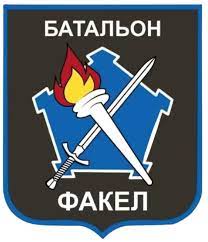Fakel (company)
 From Wikipedia the free encyclopedia
From Wikipedia the free encyclopedia
| Fakel | |
|---|---|
| Russian: факел | |
 Sleeve patch of the Unit | |
| Active | 2023 – present |
| Country | Russia |
| Branch | Gazprom Neft |
| Type | Russian irregular units PMC (allegedly) |
| Part of | Ministry of Defence (Russia) Gazprom |
| Engagements | 2022 Russian invasion of Ukraine |
Fakel (Russian: факел, lit. 'Torch') is a private military company which is currently deployed by Russia in the Russian invasion of Ukraine.[1]
History[edit]
Fakel was founded in 2023 by the Russian state run gas monopoly Gazprom subsidiary Gazprom Neft,[2] as a more loyal alternative for the Wagner Group, which at the time had just begun clashing with Russian high command on issues of supplies and tactics.[3] The group was founded alongside two other Gazprom PMCs, Plamya and Potok.[4] Fakel and Plamya reportedly are directly subordinate to the Russian Ministry of Defence, while Potok joined Redut PMC, a PMC which is also controlled by the Russian MoD.[5][6][7]
Fakel, and the other Gazprom run companies, have their recruiting base as Gazprom employees, promising them that while they are away on tour in Ukraine, that their positions at work would be guaranteed for their return. A large contingent of the fighters are from Gazprom's security guards. Fakel is also the name of a bi-annual Gazprom corporate talent competition, a big festival in which teams of musical performers of all ages compete for prizes, with the logo for the competition being very similar to the logo used by the PMC. Fakel is also the name of the company's semi-professional table tennis team. Although the company has no official political affiliation, several of its members support the Pravaya Rossiya far-right party led by Georg Borovikov seeking the restoration of the Russian Empire, which has stated that they are one of Fakel's patrons. Additional, several members of the company on Telegram stated they were fighting to restore the Empire.[8]
Yevgeny Prigozhin has been critical of Fakel, seeing the organization as competition for his Wagner group.[9] Prigozhin claims that Fakel saw combat in the Battle of Bakhmut, where they were tasked with covering Wagner's flanks, and failed to do so resulting in a successful Ukrainian flanking maneuver that resulted in a large amount of Wagner casualties. Prigozhin claimed the unit had poor training and supplies, and a lack of any "tactical-level commanders."[10] The unit has also seen combat in the Battle of Soledar.[8]
See also[edit]
References[edit]
- ^ Endo, Ryosuke (12 June 2023). "Rise of Russian Private Military Companies Foreshadows Upheaval to Come". JapanForward. Retrieved 8 July 2023.
- ^ Hird, Karolina; Bailey, Riley; Wolkov, Nicole; Philipson, Layne; Kagan, Frederick W. "Russian Offensive Campaign Assessment, April 26, 2023". Institute for the Study of War. Retrieved 8 July 2023.
- ^ Askew, Joshua (16 May 2023). "Everyone is talking about Wagner. But who are Russia's other mercenaries?". Euronews. Yahoo! News. Retrieved 8 July 2023.
- ^ Hird, Karolina; Bailey, Riley; Wolkov, Nicole; Philipson, Layne; Kagan, Frederick W. "Russian Offensive Campaign Assessment, April 26, 2023". Institute for the Study of War. Retrieved 8 July 2023.
- ^ Kossov, Igor (4 May 2023). "Army of hired guns: How Russia's 'PMCs' are becoming the main invasion force". The Kyiv Independent. Retrieved 8 July 2023.
- ^ "AFU Capture First Mercenary From PMC 'Gazprom'". Charter97. Retrieved 8 July 2023.
- ^ Matthews, Owen (28 June 2023). "The Wagner Group isn't Russia's only private army". The Spectator. Retrieved 8 July 2023.
- ^ a b Ivanova, Polina; Miller, Christopher; Seddon, Max. "'Stream' and 'Torch': the Gazprom-backed militias fighting in Ukraine". Financial Times. Retrieved 8 July 2023.
- ^ Hlushchenko, Olha. "ISW says competition between Russian PMCs is growing in Bakhmut". Ukrainska Pravda. Retrieved 8 July 2023.
- ^ Nuzhnenko, Serhii. "It's not just Wagner At least three Gazprom-linked private military companies now have fighters in Ukraine". Meduza. Radio Free Europe/Radio Liberty. Retrieved 8 July 2023.